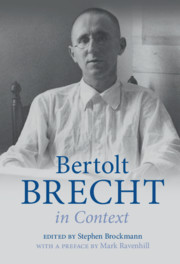Book contents
- Bertolt Brecht in Context
- Bertolt Brecht in Context
- Copyright page
- Contents
- Figure
- Notes on Contributors
- Chronology
- Abbreviations
- Preface
- A Note on Brecht in English
- Introduction
- Part I Brecht’s World
- Chapter 1 Brecht’s Augsburg Years
- Chapter 2 Models for Epic Theater from the Munich Years:
- Chapter 3 Brecht in the Weimar Republic
- Chapter 4 Brecht’s Emergence as a Young Poet
- Chapter 5 Brecht and Music: The Fly in the Amber
- Chapter 6 Brecht and Political Theater
- Chapter 7 Brecht and Germany
- Chapter 8 “[She] made suggestions. We took them”: Bertolt Brecht’s Women Collaborators
- Chapter 9 Brecht’s Interviews
- Chapter 10 Brecht and Exile
- Chapter 11 Brecht and the German Democratic Republic
- Chapter 12 The Berliner Ensemble
- Part II Brecht’s Work
- Part III The World’s Brecht
- Concise Bibliography
- Index
Chapter 11 - Brecht and the German Democratic Republic
from Part I - Brecht’s World
Published online by Cambridge University Press: 28 May 2021
- Bertolt Brecht in Context
- Bertolt Brecht in Context
- Copyright page
- Contents
- Figure
- Notes on Contributors
- Chronology
- Abbreviations
- Preface
- A Note on Brecht in English
- Introduction
- Part I Brecht’s World
- Chapter 1 Brecht’s Augsburg Years
- Chapter 2 Models for Epic Theater from the Munich Years:
- Chapter 3 Brecht in the Weimar Republic
- Chapter 4 Brecht’s Emergence as a Young Poet
- Chapter 5 Brecht and Music: The Fly in the Amber
- Chapter 6 Brecht and Political Theater
- Chapter 7 Brecht and Germany
- Chapter 8 “[She] made suggestions. We took them”: Bertolt Brecht’s Women Collaborators
- Chapter 9 Brecht’s Interviews
- Chapter 10 Brecht and Exile
- Chapter 11 Brecht and the German Democratic Republic
- Chapter 12 The Berliner Ensemble
- Part II Brecht’s Work
- Part III The World’s Brecht
- Concise Bibliography
- Index
Summary
This chapter examines Brecht’s complicated relationship with the German Democratic Republic and its leaders.In 1948, after the end of World War II, Brecht returned to Germany and ultimately settled in East Berlin in the GDR, where he became the artistic leader of the famous Berliner Ensemble, the most influential postwar theater group in the world. However, because of his revolutionary approach to drama and aesthetics, Brecht quickly ran into conflict with East German leaders and had to endure a series of criticisms and accusations against himself and his artistic collaborators. Brecht also sought to democratize and liberalize the artistic and cultural sphere of the GDR. Ultimately, Brecht’s relationship with socialist leaders in the GDR represented a push-pull and give-and-take. Each side had to compromise, and each side received something in return. Brecht received his own theater and the ability to perform plays as he wished, while the leaders of the GDR were able to bathe in the glory of Brecht’s international artistic success.
Keywords
- Type
- Chapter
- Information
- Bertolt Brecht in Context , pp. 97 - 104Publisher: Cambridge University PressPrint publication year: 2021

